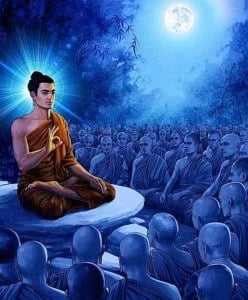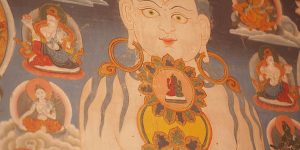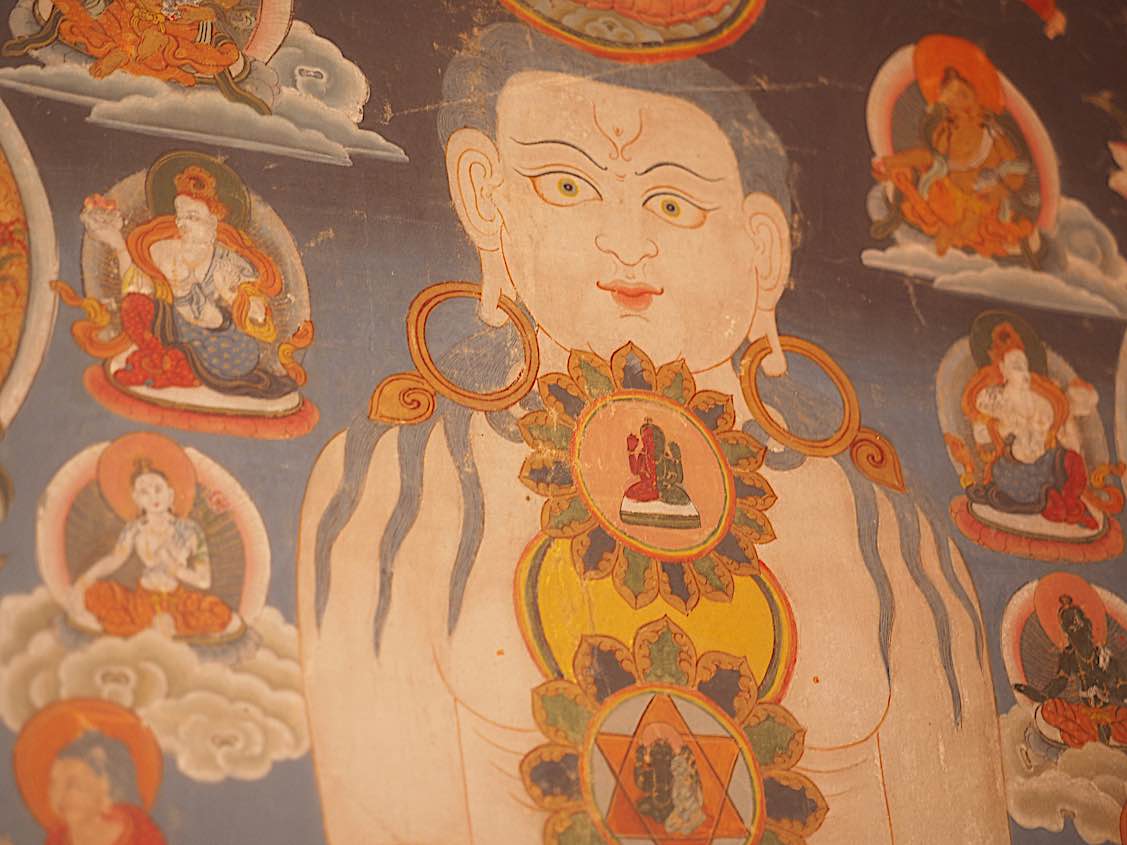What does Buddhism say about the idea of God? Best answer: ‘it’s complicated.” Are Buddhists theists, atheists or non-theists? Does it even matter?
Do Buddhists believe in God? What does Buddhism teach about the idea of God?
Many people, not familiar with Buddhist thought, assume that the label of “religion” means Buddhists must believe in some type of God. There’s the opposite nihilistic extreme — those who have studied a little about Buddhism — and assume that the Dharma of Buddha is atheistic or non-theistic. Neither concept is right or wrong.
Feature by Lee Clarke
NOTE: Feature is the point-of-view of the author.
There are many views on this topic. Citations included.

Part of the problem, of course, labels. Buddhism has a lot more to say on labels and imputing concepts than it does about gods and deities — and “religion” is clearly a problematic label.
The Buddhist path embraces everyone, regardless of any belief in God — or not. Atheists Buddhists, Christians, shamans, pagans, agnostics, or “undecideds” can all equally practice the Buddha’s teachings. Whether your concept of God is an all-powerful, all-knowing “capital G” God, or a less defined concept of universal consciousness, or a nature deity, or the more practical “meditational deity” — Buddhism welcomes all of these equally. [Note: We’re speaking about Buddhism generally; there are some schools, however, which have stricter ideas on divinities, beyond the scope of this story.]
What did Buddha say?
So, what did Buddha actually say about divine beings? Buddha lived in a time totally different from our own — a time in which belief in Gods and divine interventions was incredibly natural and universal.
It is clear from many Buddhist suttas (sutras) — supported by the views of many scholars — that the Buddha did not deny the gods. When he did mention them, they seemed unimportant. He matter-of-factly described them, as he might talk about an ordinary person. On the other hand, he did NOT criticize them, or any other belief. It is clear from various sutta references that he viewed gods as sentient beings trapped in the same cycle of Samsara and suffering as human beings.
Karen Armstrong, a well-known scholar of religion explains:
“The Buddha believed implicitly in the existence of the Gods since they were a part of his cultural baggage, but he didn’t believe them to be much use to mankind. They too were caught up in the world of pain and flux…they were involved in the cycle of rebirth like all other beings and eventually, they would disappear”. [1]
Not only do the Gods appear regularly in the Pali Sutta and Mahayana Sutra — but they also are referenced by the Buddha in the Dhammapada:
“Even the Gods emulate those who are awakened. Established in meditation, they live in freedom, at peace”.
“Let us live in joy, never hoarding things among those who hoard. Let us live in growing joy like the bright Gods.” [2]
“But who can blame those who are pure, wise, good and meditative? They shine like a coin of pure gold. Even the Gods praise them, even Brahma, the creator”. [3]
It is clear that Buddha believed in (or didn’t deny) the Gods — including one who could be considered a Creator. Then, why is Buddhism considered by many to be atheistic or nontheistic?
The Poisoned Arrow parable

The answer to this can be known by the famous parable of the poisoned arrow. Malunkyaputra, a very inquisitive follower of the Buddha’s, asked the Buddha deep metaphysical questions such as whether or not a person exists after death after having attained nirvana, whether the world is eternal or not and other metaphysical questions. The Buddha replied:
“Suppose Malunkyaputra that a man has been wounded by a poisoned arrow and his friends and family are about to call a doctor. “Wait!” he says. “I will not let this arrow be removed until I have learned the caste of the man who shot me. I have to know how tall he is, where his family comes from, where they live, what kind of wood his bow is made from, what Fletcher made his arrows. When I know these things, you can proceed to take the arrow out and give me an antidote for its poison. What would you think of such a man?”
“He would be a fool, blessed one.” Replied Malunkyaputra shamefacedly “his questions have nothing to do with getting the arrow out and he would die before they were answered.” [4]
In the same way, Buddha replied, to Malunkyaputra’s questions, his job isn’t to answer these metaphysical questions. It is to show people how to achieve nirvana and release themselves from suffering.

The reason why the Buddha does not talk much about God, especially in Pali Sutta, is simply that belief in God is not necessary to achieve enlightenment. It should be noted that he doesn’t confirm or reject this belief, but merely puts it aside.
As Barbara O’Brien states:
“Buddhism is not about either believing or not believing in God or gods. Rather, the historical Buddha taught that believing in gods was not useful for those seeking to realize enlightenment. In other words, God is unnecessary in Buddhism, as this is a practical religion and philosophy that emphasizes practical results over faith in beliefs or deities.” [5]
The Dalai Lama in an article on his website comparing the doctrines of theistic religions says the same thing, that Buddhism along with the contemporary religion of Jainism does not focus on God:
“Then, around 2,600 years ago, Buddha and the Jain founder, Mahavira, came. Neither of them mentioned God but emphasized instead simply cause and effect. Thus, one category of Samkhya and both Jainism and Buddhism are non-theistic religions.” [6]
Too many questions: the parable of the handful of leaves
Does this mean Buddha didn’t have the answer to these metaphysical questions? In the Samyutta Nikaya he explains he knows much more than he is revealing, through the parable of a handful of leaves:
“…Then the Blessed One took up a few simsapa leaves in his hand and addressed the monks thus: “What do you think, Monks, which is more numerous: these few leaves that I have taken up in my hand or those in the grove overhead?”
“Venerable sir, the leaves that the Blessed One has taken up in his hand are few, but those in the grove overhead are numerous.”
“So too, Monks, the things I have directly known but have not taught you are numerous, while the things I have taught you are few. And why monks have, I not taught you those many things? Because they are without benefit, irrelevant to the fundamentals of spiritual life…” [7]
As Dr. Alexander Berzin writes, there were fourteen such metaphysical questions on which the Buddha maintained silence when he was asked about them, again neither confirming or denying them which included most of those asked by Malunkyaputra. [8]
Bramajala Sutta, the impermance of all, including gods
The Buddha mentions Brahma explicitly in the ‘Brahmajala Sutta’ and assigns him many characteristics that people would normally ascribe to ‘God’ as believers know him today:
“And then, monks, that being who first arose there thinks: “I am Brahma, the Great Brahma, the Conqueror, the Unconquered, the All-Seeing, the All-Powerful, the Lord, the Maker and Creator, Ruler, Appointer and Orderer, Father of All That Have Been and Shall Be. These beings were created by me. How so? Because I first had this thought: ‘Oh, if only some other beings would come here!’ That was my wish, and then these beings came into this existence!”
He goes onto to describe it as a wrong view that one should think that though Brahma is eternal, we whom he created and the conditions of the world are impermanent:
“That Brahma, … he made us, and he is permanent, stable, eternal, not subject to change, the same forever and ever. But we who were created by that Brahma, we are impermanent, unstable, short-lived, fated to fall away, and we have come to this world.’ This is the first case where-by some ascetics and Brahmins are partly Eternalists and partly Non-Eternalists.” [9]
Earlier in the sutta, the Buddha clarifies that the views of some Brahmins and ascetics who hold views that the self is ‘partly eternalists, partly not-eternalists’ which as we know is contradicted by the Buddhist doctrine of Anatta. He was condemning this idea as wrong. He didn’t say that believing in a creator was right or wrong, nor did he specifically address this point.
Buddha: neither accepted nor rejected God
Therefore, the Buddha’s view on the concept of God was neither to accept, nor reject the concept of a creator or creation. Even if he believed in these things himself, he viewed the answers to these questions as not necessary to achieving enlightenment. So, a Buddhist can believe in, and even worship a God, should they wish but enlightenment can only be achieved by one’s own effort, it is completely up to the individual.
However, atheism is also perfectly compatible with Buddhism too, and some Buddhist thinkers reject the concept of a creator based on Buddhist philosophy and doctrine. Dr. V.A. Gunasekara for example, says that the concept of a God is incompatible with the idea of the three marks of existence.
“A fundamental Buddhist belief is that all phenomena without exemption (including all animate beings) have three essential characteristics. These are dukkha (explained above), anicca (impermanence), and anatta (insubstantiality, “no-soul”). The attributes of God are not consistent with these universal marks of existence. Thus God must be free from dukkha; he must be eternal (and hence not subject to anicca); finally, he must have a distinct, unchanging identity (and therefore lack the characteristic of anatta). [10]
The Venerable S Dhammika also categorically denies that Buddhism believes in a God for many reasons, including that it is based on fear and appealing to more traditional arguments such as lack of evidence. [11]
Nicholas Niusuwan, A Buddhist writer for HuffPost in addressing whether or not Buddhism is a Philosophy or Religion, says the following:
“Unless one defines religion as having a centralized belief system based on a god or set of gods, which isn’t the definition used by everybody, Buddhism does have religious aspects.” [12]
Barbara O’Brien says: “If atheism is the absence of belief in a God or gods, then many Buddhists are, indeed, atheists.” [13]
Scientific Buddhists and Athiest Buddhists
There appears to be plenty of room for atheistic or scientifically-minded Buddhists within Buddhism as well as theists and anything else too. However, there is also a middle ground approach that has not been considered yet. In her book ‘A History of God,’ Karen Armstrong states the following and quotes Edward Conze and his book ‘Buddhism: its essence and development’:
“Nirvana literally means ‘cooling off’ or ‘going out’ It is not merely a negative state, however, but plays a role in Buddhist life that is analogous to God. As Edward Conze explains in ‘Buddhism: Its Essence and Development’ Buddhists often use the same imagery as theists to describe Nirvana, the ultimate reality:
‘We are told that Nirvana is permanent, stable, imperishable, immovable, ageless, deathless, unborn, and unbecoming. That it is power, bliss and happiness, the secure refuge, the shelter, and the place of unassailable security: that it is the real truth and the supreme reality, that it is the good, the supreme goal, and the one and only consummation of our life. The eternal, hidden and incomprehensible peace.’
Some Buddhists might object to this comparison because they find the concept of ‘God’ too limiting to express their conception of ultimate reality…We could not define Nirvana because our words and concepts are tied to the world of sense and flux… When asked if a Buddha who had attained Nirvana lived after death, he dismissed the question as improper… the word ‘exist’ bore no relation to any state that we can understand. The Buddha was trying to show that language was not equipped to deal with a reality that lay beyond concepts and reason.” [14]
Maybe the whole issue should be seen in another way. As Karen says, maybe Buddhists and Theists are actually addressing the same reality in different terms. This reality is what Buddhists call ‘Nirvana’ and what followers of theistic religions call ‘God.’ Though this really is thought of very differently in each religion, it is still the same. Thinking along these lines can offer a great way to engage in interfaith dialogue with followers of other faiths and offers Buddhists a profound new way of looking at the Buddhist path that is defiantly food for thought.
To conclude then, As stated at the beginning of the article, in Buddhism, there is room for all types of views on the idea of God. One can be an Atheist Buddhist, Christian Buddhist, Scientific Buddhist or any other kind of Buddhist, one can even follow another faith and aspects of Buddhism at the same time. Buddhism neither confirms nor denies the idea of God and different interpretations of Buddhist scripture and philosophy can give a diverse and rich variety of views and ideas about God as hopefully shown successfully in this article. The discussion is an important one and one that maybe we should think about as Buddhists in today’s increasingly connected world.
Still, when somebody asks what Buddhists believe about God, maybe the best answer would be: “It’s complicated!”
NOTES
[1]Karen Armstrong ‘A History of God’ (William Heinemann Ltd: the UK, 1993. P. 43
[2]Eknath Easwaran (trans) ‘The Dhammapada’ (Nilgiri Press: California, United States, 2008) Pp. 169 and 177
[3Eknath Easwaran (trans) ‘The Dhammapada’ (Nilgiri Press: California, United States, 2008) P.189
[4]Eknath Easwaran (trans) ‘The Dhammapada’ (Nilgiri Press: California, United States, 2008) PP. 56-57
[5]Barbara O’Brien, ‘Atheism and Devotion in Buddhism’. At https://www.thoughtco.com/atheism-and-devotion-in-buddhism-449718 [Accessed 20th September 2018]
[6]Dalai Lama ‘The Relevance of Religion in Modern Times’ at https://www.dalailama.com/messages/religious-harmony-1/the-relevance-of-religion-in-modern-times [Accessed 20th September 2018]
[7]Bhikkhu Bodhi ‘In the Buddha’s Words: An Anthology of Discourses from the Pali Canon’ (Wisdom Publications: USA, 2005). P. 360
[8]Dr Alexander Berzin ‘The Fourteen Questions To Which Buddha Remained Silent’ at https://studybuddhism.com/en/advanced-studies/abhidharma-tenet-systems/time-the-universe/the-fourteen-questions-to-which-buddha-remained-silent [Accessed 20th September 2018]
[9]Wikipitaka ‘The Brahmajala Sutta’ at https://tipitaka.wikia.com/wiki/Brahmajala_Sutta [Accessed 20th September 2018]
[10]Dr V.A. Gunasekara ‘The Buddhist Attitude to God’ at https://www.budsas.org/ebud/ebdha068.htm [Accessed 20th September 2018]
[11] Ven S Dhammika ‘Buddhism and the God-Idea’ at https://www.buddhanet.net/e-learning/qanda03.htm [Accessed 20th September 2018]
[12] Nicholas Niusuwan ‘Is Buddhism a Philosophy or a Religion?’ at https://www.huffingtonpost.com/nicholas-liusuwan/is-buddhism-a-philosophy-_b_10176992.html [Accessed 20th September 2018]
[13]Barbara O’Brien, ‘Atheism and Devotion in Buddhism’. At https://www.thoughtco.com/atheism-and-devotion-in-buddhism-449718 [Accessed 20th September 2018]
[14]Karen Armstrong ‘A History of God’ (William Heinemann Ltd: UK, 1993. PP. 44-45 Quoting Edward Conze ‘Buddhism: Its essence and development (Oxford 1959), P.40
5 thoughts on “What does Buddhism say about the idea of God? Best answer: ‘it’s complicated.” Are Buddhists theists, atheists or non-theists? Does it even matter?”
Leave a Comment
More articles by this author
Search
Latest Features
Please support the "Spread the Dharma" mission as one of our heroic Dharma Supporting Members, or with a one-time donation.
Please Help Support the “Spread the Dharma” Mission!

Be a part of the noble mission as a supporting member or a patron, or a volunteer contributor of content.
The power of Dharma to help sentient beings, in part, lies in ensuring access to Buddha’s precious Dharma — the mission of Buddha Weekly. We can’t do it without you!
A non-profit association since 2007, Buddha Weekly published many feature articles, videos, and, podcasts. Please consider supporting the mission to preserve and “Spread the Dharma." Your support as either a patron or a supporting member helps defray the high costs of producing quality Dharma content. Thank you! Learn more here, or become one of our super karma heroes on Patreon.
Lee Clarke | Contributing Author
Author | Buddha Weekly
“I’m a Buddhist, Quaker, Humanist, existentialist and pacifist. Budding professor of religion. Love many subjects, bilingual third year uni student.”
















You failed to add your definition of dukkha. It seems to mean suffering. I’m relying on Chrome’s search of the page, finding just the two occurrences, both in the same paragraph. I suggest you think about the concept of existence. It is not the same as phenomenal things. For instance, are you a phenomenon? How do you know you exist? I focus, over the years, on the existence of the unknown. Does the unknown exist? I fall in the dark and hit my head. I don’t know what I hit. Did I hit anything? That’s a crude, rushed example. It seems we need to affirm the existence of the unknown in order to justify investigating it. It might be as small as the microscope slide you’re about to put under the microscope, as small as the center portion, as small as the part you’re focusing in on. Before I got that, I came up with “the unknown is good”. This seems the basic claim of any happy person. If the unknown is bad, and it exists, then all hope is lost, etc. If the unknown does not exist, the only thing that exists is—what? The koan, “‘What?’ is the sound of one hand clapping” argues that we are always in contact with the unknown, or are at least in those times we recognize it with a “what?”.
Enjoyed this as I an researching all the great World Faiths. As much as I love, need and appreciate the state of detachment, which seems to be the main idea in Bhuddhism, I have always had trouble with 2 aspects of the way it is practiced, one is that people seem to be satisfied with detachment as being the end of the game in Buddhism , to be one with all, or attain Nirvana, they find it their “end aim”. In my opinion life is not that easy, I feel that our conscience is an integral part of our being, and through our detached conscience, or our conscious awareness that we are detached, and this experience, I feel we are then called to be responsible towards what we witnessed and experienced, basically, you can’t use detachment, or Nirvana, to avoid what detachment enables us to see. It is only the beginning.
The second part that I have trouble with is that, for many people, we are already a witness to a Creator, we know there exists a Creator, or God… it is as clear to us as the noon day sun, there are accounts of this state certainty in all traditions whether religious throught the great Faiths, or in the native or tribal traditions … it happens through being made aware, it is a gift, God, or the Creator, reveals his (His, Her, It’s) existence to some people and I can only guess that it happens when people are sincerely searching …maybe we are made aware as a result of the degree of sincerity maybe? and there are practices in Buddhism which seem to give us a license to avoid this reality, it is like a license to take the easy road of avoiding the responsibility that comes after the realization of a Creator, you are taught the with idea of detachment from all, including God, your journey comes to an end, with the experience of detachment being the ultimate… I feel this lacks humility because when you realize the existence of a Creator, then you have responsibility. With knowledge of a Creator there comes the desire and responsibility to seek him out. (Him Her It) to know God better … it is Love.
This is why I believe that the realization of the concept of God is a ‘result’ of the practices of Bhuddism. But after the realization, one has responsibilities, Things have just started. I will even go as far as to state that I believe some interpretations of Buddism, such as this form I just mentioned, encourage apathy. I believe that the idea of a Creator is maybe a more important aspect of Buddhism and has gotten buried by semantics or misinterpretations through time. It was maybe more prevalent in it’s inception.
Hi Ed, and thanks for commenting. Keep studying Buddhism (not just here on Buddha Weekly — it’s one of the philosophies with among the largest body of written teachings) and you’ll start to gradually see that most of what you have trouble with (in your comments) arise from two things: attachment to concepts and your certainties, and a very surface (not even scratched surface) notion of the deep practice of Buddhism. (Detachment isn’t a Buddhist teaching). On the other hand, Metta and Karuna (Loving Kindness and Compassion) are extremely important Buddhist practices. Even on this site, if you do a search on Bodhichitta (loving-kindness, etc) you’ll find over 70 features dedicated to Compassion, loving-kindness (Metta), Tonglen, etc, etc (here’s a search link for research: https://buddhaweekly.com/?s=bodhichitta )
There’s no notion in Buddhism — except perhaps in Hollywood movies and so on (mostly focused on Zen Buddhism) — of “detached conscience” — the two aspects of Buddhism that are most important (certainly in Mahayana) are Compassion and Wisdom.
There’s a famous “Zen” story of a Chan master who was trying to teach a Western professor of Philosophy. He poured a cup of tea until it overflowed: The master served tea and kept on pouring until it was overflowing from the cup:
“The professor watched the overflow until he could no longer restrain himself: ‘It is overfull, no more will go in!’
‘Like this cup’ Nan-In said ‘You are full of your own opinions and speculations. How can I show you Zen unless you first empty your cup?’ (this if from our feature on Zen “Outside tradition and scripture” https://buddhaweekly.com/outside-tradition-and-scripture-zen-buddhism-if-you-meet-the-buddha-kill-him/ )
While the wisdom “half” focuses on meditation — including, of course calm-abiding meditations, mindfulness, analytical meditation, debate, and so on — the Compassion “half” embraces morals, ethics, and conscience. Every Buddhist Practice starts and ends with compassion for all sentient beings. We start with Refuge in the Three Jewels — for the benefit of all sentient beings. We state, in most practices the Bodhichitta promise (Love and Compassion, Metta and Karuna). We state the Four Immeasurables: “May all beings have happiness and its causes, etc.” We end our practices with a dedication for the “merit of all sentient beings to remove their suffering.”
I point this out to emphasize that “detachment” is not a correct view of Buddhism. Buddha taught us how to gradually remove our reliance on our attachments — but his is the middle way, so detachment is not part of the path (gradually comprehending the trap of “attachments” etc is not the same as becoming detached).
No attachment, but no detachment either.
Certainly no apathy, since to be a Buddhist requires a LOT of hard work and it involves helping all sentient beings. One famous Dhamapada verse says: “All the effort must be made by you; Buddhas only show the way.”
Buddha never taught any extremes of any kind — it’s the path of the Middle Way — so both of your points are — while quite understandable, given popular cultural portrayals of Buddhism — are not even suggested in Buddha’s teachings (unless words are attributed either out of context or incorrectly). Buddhism is neither nihilistic nor does it embrace the opposite (it’s the middle way). It is neither detached nor attached. While it embraces compassion and helping all sentient beings, it does not go to the opposite extreme of incapacitating despair. Buddha didn’t teach there was no God, he taught that God can’t help us on our personal path to Enlightenment. In other words, Buddha taught us that what we thought was important, really isn’t.
I hope you’ll continue studying, and especially focus on the Compassion (Metta, Karuna) studies, as this is a very large part of Buddhism. I hope this is helpful.
Regarding God, please see Lankavatara sutra where Buddha says that Vyasa is one of his names from previous lives (ch. 60) and that among his countless names are Vishnu, Ishvara, Kapila, Rama or Vyasa [i.e. Vishnu avataras] (ch. 76). In Dasharatha jataka he proclaims himself to be Rama. Etc.
What if it turns out that the Buddha’s Parable of the Poisoned Arrow turned out to be just a bit off the mark? What if getting to know God is not actually equivalent to getting to know the guy who shot the arrow, but rather it is equivalent to getting to know the Doctor who is able to heal the person? Hope I am not being offensive to anyone by questioning the Buddha. I actually think that the Buddha would be ok with asking questions on the path to enlightenment.